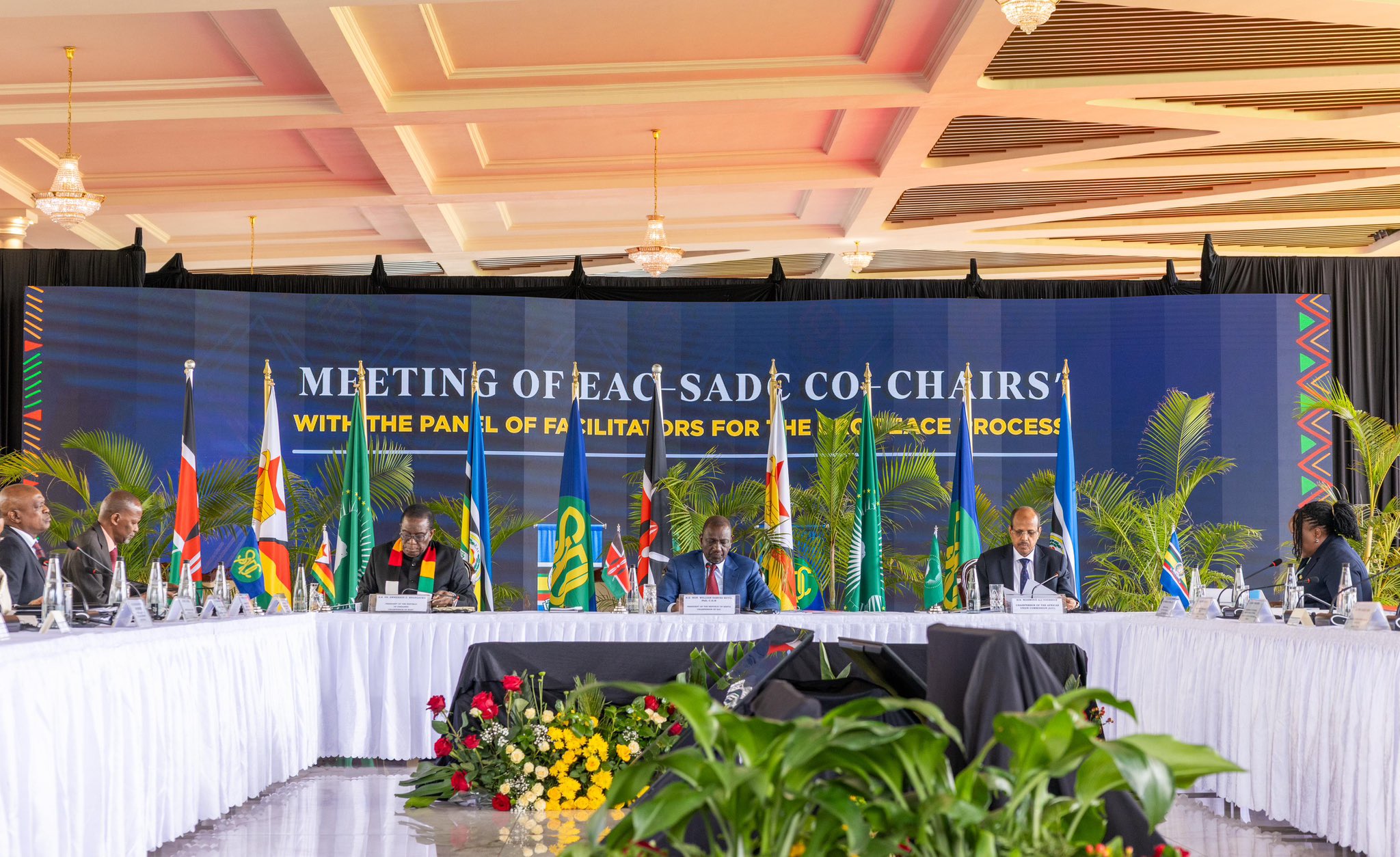

African leaders are back to exploring local solutions to the DRC insecurity problem even after the US and Qatar-brokered peace deals were signed in Washington and Doha respectively.
Kenya on Friday hosted the Joint East African Community-Southern African Development Community Co-Chairs' Meeting to discuss the ongoing peace process in the DRC.
The meeting brought together the chairpersons of EAC (President William Ruto), SADC (Emmerson Mnangagwa) and African Union Commission (Mahmoud Youssouf).
EAC and SADC secretary generals and the Panel of Facilitators also attended the peace process.
The panel is comprised of former Nigerian President Olusegun Obasanjo, retired President Uhuru Kenyatta, former South African President Kgalema Motlanthe, former CAR President Catherine Panza and former Ethiopian President Sahle-Work Zewde.
They were named following a decision by regional leaders to merge the Uhuru-led Nairobi Process on peace restoration in the Eastern DRC with the AU-sanctioned Luanda Process.
The EAC and SADC Summit sought to reinforce collaboration and promote coherence in regional efforts to restore peace and security in eastern DRC.
The meeting adopted, among other resolutions, the immediate merger of the EAC-SADC and AU structures to comprise of the AU Mediator, EAC-SADC Panel of Facilitators, to report to the Joint EAC-SADC Summit and the AU.
It also directed the immediate merger of the technical secretariats of the AUC, EAC and SADC into a Joint Secretariat, led by the AUC in Addis Ababa, to operationalize the joint structure.
Further, the leaders resolved to consolidate the Terms of Reference (ToRs) and related documents for the AU Mediator and EAC-SADC Panel of facilitators to be endorsed by the Joint EAC-SADC Summit.
The meeting happened soon after Rwanda and the DRC, along with observers from the US, Qatar, Togo, and the AU Commission held the first meeting of the Joint Oversight Committee for the Peace Agreement Between the DRC and Rwanda that was signed in Washington, D.C. on June 27.
The region has experienced escalating violence this month. At least 49 people were killed on the night of July 26-27 by individuals believed to be elements of the Islamic State-affiliated Allied Democratic Forces (ADF) insurgent group in Komanda town, Irumu territory, Ituri province.
Among those killed were nine children, with several other people injured and abducted. Shops and homes were set on fire.
The incident comes after ADF attacks earlier in the month killed 82 civilians in Ituri and North Kivu provinces.
This is despite the Rwanda-DRC peace deal that was signed in June deal brokered by President Donald Trump.
The US-led process deferred the resolution of the M23 conflict to the Qatari-talks but made a DRC-M23 peace deal a precondition to the future investment deal.
Consequently, on July 19, the representatives of the DRC government and the M23 rebel group signed another deal to stop the fighting in the eastern region.
The agreement sought to “create favourable conditions” for future peace talks and binds “all forces engaged in the conflict” to observe a ceasefire monitored by an oversight mechanism and cease all attacks, acts of sabotage and attempts to gain new territory.
The signing of the declaration of principles was welcomed by the African Union, which termed it a “significant development”.
“This marks a major milestone in the ongoing efforts to achieve lasting peace, security and stability in eastern DRC and the wider Great Lakes region,” AU chairperson Mahmoud Ali Youssouf said in a statement.
He reaffirmed the African Union’s full support for the implementation of the agreement and called on all stakeholders, governments, armed groups, civil society and international partners to honour their commitments and contribute to durable peace.
The chairperson added that the AU stands ready to accompany the parties in their post-conflict recovery, national reconciliation and peacebuilding efforts.
“The African Union remains committed to promoting African-led solutions to African challenges in line with the spirit of Silencing the Guns in Africa by 2030 and the aspirations of Agenda 2063,” the AU statement added.
However, following what some insiders in the peace process termed a hostile takeover of the mediation processes by the US, the African-led process was considered crippled as parties to the conflict by-passed the ongoing mechanisms.
The Institute for the Study of War warned in a July 24 report that fighting will likely continue, and that negotiations for a long-term peace agreement could collapse.
The report noted that the ceasefire agreement did not address the central issue of M23 territorial control and that it provided a compressed timeline to address the highly contentious topic.













